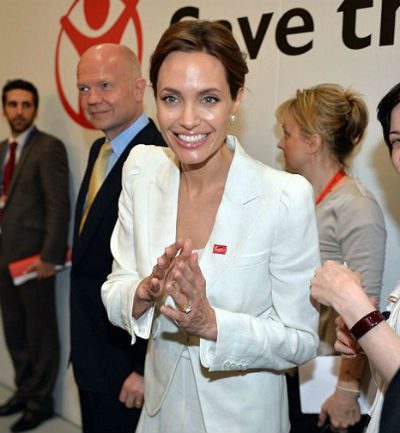Angelina Jolie Hosts Global Summit
We’ve heard for decades that “war is hell,” but as Angelina Jolie declared at the Global Summit to End Sexual Violence in Conflict which was held last week in London, for millions around the globe, war is rape and the threat of rape. As Jolie and myriad survivors who spoke at the summit clarified and underscored again and again, for generations war and rape have been viewed as inextricable from each other.
Jolie said they need not be.
Jolie organized and co-chaired the summit with U.K. Foreign Secretary William Hague.
At the end of the summit, which drew attention to the millions of women and girls, as well as some boys and men, who have been raped in conflict zones, Jolie, Oscar-winning actress and U.N. Special Envoy to the U.N. Commissioner for Refugees (UNHCR), was made Honorary Dame Commander of the Most Distinguished Order of St. Michael and St. George (DCMG) by Queen Elizabeth II, “for services to U.K. foreign policy and the campaign to end war zone sexual violence.”
More than 100 countries were represented at the conference which also put the spotlight on survivors and advocates from around the globe. Experts on sexual violence, members and representatives of NGOs and other international agencies as well as medical personnel working in conflict-torn regions were all in attendance, along with worldwide media.
Jolie, 39, has worked with the UNHCR since 2001 and since 2007 has co-chaired the Education Partnership for Children of Conflict for the Clinton Global Initiative, which funds education programs for children affected by conflict and disaster.
Jolie, who has traveled to more than 30 countries on behalf of UNHRC, said she does the humanitarian work to bring “awareness to the plight of these people. I think they should be commended for what they have survived, not looked down upon.”
Jolie works predominantly with refugees, which has inevitably led her to work with survivors of sexual assault in conflict, as many women and girls fleeing conflict zones have been raped. Jolie has appeared before various congressional committees to address these issues and others related to women and children.
Part of her focus as UNHCR Special Envoy has been to push for legislation to aid child refugees and other vulnerable children in both developing nations and the U.S.
The U.N. estimates between 75 and 80 percent of the world’s refugees are women and girls and that women and girls are dramatically impacted by war, conflicts and insurgencies worldwide. The number of sexual assaults–especially gang rapes–perpetrated in these various wars and conflicts over the length of the conflicts is in the millions.
According to a report in May 2011 in the American Journal of Public Health, for example, during the insurgency in Congo, four women were raped every five minutes in the DRC. A survivor of rape in Sudan told Jolie at the summit, “I cannot count how many times I was raped by the LRA (Lord’s Resistance Army)rebels … I was raped so I couldn’t even move.”
Other details from the summit including that in 2010, 30 percent of women in Eastern Congo reported conflict-related sexual violence and that rape was used as a genocidal tool in Sudan, Rwanda and Bosnia. Many soldiers told their victims that they would now be pregnant with the aggressors’ child, obliterating their own race or nationality–rape used as a form of ethnic cleansing.
Rape has become a tool of conflict, but Jolie opened the summit June 10 stating unequivocally that rape was by no means an inevitable by-product of war. Jolie said, “It is a myth that rape is an inevitable part conflict. There is nothing inevitable about it. It is a weapon of war aimed at civilians. It has nothing to do with sex, everything to do with power.”
The main focus of the summit was addressing all sexual violence that arises out of war and conflict, including sexual trafficking and sexual slavery like that promulgated by Nigeria’s terrorist group, Boko Haram, which took responsibility for abducting 300 Nigerian schoolgirls April 14.
The schoolgirls have not been rescued.
Rape of girl children is a particular concern of advocates working with survivors of conflict rape, as are children born of rapes. Women who give birth after being raped are stigmatized and brutalized, often banished from their families and communities, as if they are the criminals, instead of the rapists. Children who are raped suffer lifelong physical and psychological trauma and injury which can also result in ostracization.
Beyond naming the how prevalent rape in conflict is, the goals of the summit included “ending the culture of impunity” by creating an international protocol for documenting and investigating sexual violence in conflict zones; taking steps to protect women, like training soldiers and peacekeepers; creating support for human rights activists and survivors of conflict rape; and making conflict rape a visible issue to be addressed globally.
In addition to the testimony of survivors, medical personnel discussed ways in which rape in conflict could be addressed. Physicians for Human Rights is developing an app to help doctors document evidence of sexual violence with the goal of prosecution.
On June 13, Secretary of State John Kerry addressed the summit on its final day, asserting it was time for the world to banish conflict rape “to the history books where it belongs. It’s time for us in an age where we see enough of chaos, failed and failing states, to write a new norm, one that protects women, girls, men, boys, protects them from these unspeakable crimes.”
But as U.N. Women Executive Director Phumzile Mlambo-Ngcuka said at the conference, “What should be an aberration continues to be an epidemic. We are barely scratching the surface.”
In the end, care for survivors, protection for likely victims, prosecution of perpetrators and an over-arching political will to end rape in conflict is what will create change. The summit was an important step, but what happens next remains to be seen.
